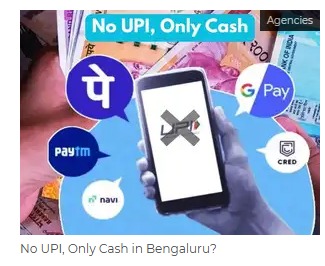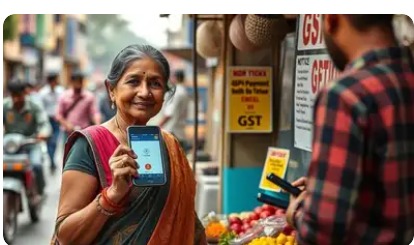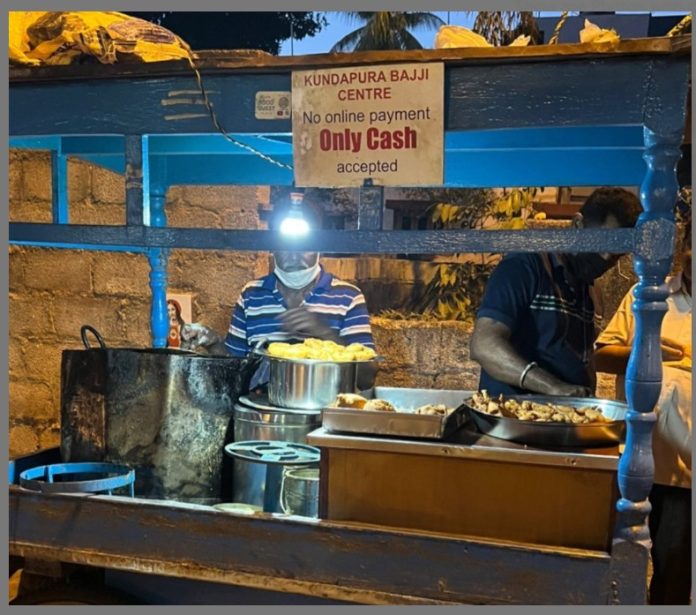– Mohammed Talha Siddi Bapa
Bengaluru: On the Pavement, Where the Digital Dream Cracks: “QR code hata diya sir… ab sirf cash.”
At a bustling corner in Jayanagar, Manjunath pours hot tea into a steel tumbler and gestures toward the dust-covered signboard that once held a UPI QR code. “Jo bhi kamaate hain, uska hisaab mangte hain… kaise denge?” he mutters, serving his tenth customer of the morning.
 His sentiment echoes across the city. From KR Market to Shivajinagar, a silent digital retreat is underway. Vendors, who until recently boasted of seamless payments and cashless convenience, are now pulling down QR codes – out of fear, not defiance.
His sentiment echoes across the city. From KR Market to Shivajinagar, a silent digital retreat is underway. Vendors, who until recently boasted of seamless payments and cashless convenience, are now pulling down QR codes – out of fear, not defiance.
The Numbers That Stirred the Storm
Over 14,000 small traders in Bengaluru were flagged by the state’s Commercial Taxes Department for exceeding the annual turnover limit that warrants GST registration:
- ₹40 lakh for goods
- ₹20 lakh for services
Among them, 5,500 vendors have already received official notices – most of them based on their digital transaction records from platforms like PhonePe, Google Pay, and Paytm between 2021 and 2024.
“Hamare liye UPI tha asaan, ab wahi sabse bada khatra ban gaya,” says Shakeela Begum, who sells homemade pickles and snacks near BTM Layout.
Digital Pride, Now a Legal Trap
India has long projected its digital payments revolution as a model for the world – fast, inclusive, and transformative. Bengaluru, the so-called Silicon Valley of India, became its flagship. But for many who embraced it early – street hawkers, flower vendors, cobblers – the technology now threatens their very livelihood.
 Many vendors don’t issue formal invoices. Some use personal UPI accounts to receive business and family payments alike. To them, a sudden notice demanding tax returns and justifications is nothing short of an earthquake.
Many vendors don’t issue formal invoices. Some use personal UPI accounts to receive business and family payments alike. To them, a sudden notice demanding tax returns and justifications is nothing short of an earthquake.
“I don’t even make ₹500 profit a day,” says Muniraju, a banana vendor near Banashankari. “But my UPI went above ₹40 lakh in a year because customers liked digital. Ab kya karoon, jail jaaun?”
The Voices Behind the Panic
“I sell raw mangoes and coconut water. But because I accept UPI, they think I run a big business.”
– Rafiq, vendor near Frazer Town
“My UPI shows ₹38 lakh, but it includes transfers from relatives during COVID. Why is that being taxed?”
– Latha, homemaker-turned-entrepreneur
The Department Responds: Law Above All
In its official statement dated July 12, the Karnataka Commercial Taxes Department clarified:
“GST is based on turnover – irrespective of whether payment is in cash, card, or UPI. Registration is mandatory once threshold is crossed.”
They added that vendors have the opportunity to explain exempt income, such as the sale of unbranded food, vegetables, or items not falling under taxable goods. But to most vendors, the language is alien, the process intimidating, and the system unforgiving.
A Fine Print That’s Lost in Translation
Experts argue that much of the panic stems from a lack of awareness and poor communication.
“Digital payment footprints are being treated as clean proof of taxable turnover, which is problematic when UPI is used for mixed purposes,” says chartered accountant Deepak Nayak. “The department should’ve first educated, then enforced.”
Worse, the GST portal remains unfriendly to those who don’t speak English or Kannada. For a Tamil-speaking or Urdu-speaking vendor, even reading the notice is a challenge – let alone replying to it.
The Larger Fallout: Retreat from Digital India
This isn’t just a tax issue. It’s a trust crisis.
A movement that was meant to empower the informal sector has now spooked it. A QR code, once a symbol of modernity, now feels like a surveillance tool. Bengaluru’s daily shoppers are also feeling the shift:
“Earlier I just scanned and paid. Now everyone asks for cash. Sometimes I don’t even have ₹50 in my wallet,” says Rukmini, a tech employee at Manyata Tech Park.
In essence, the city that helped build India’s digital backbone is now watching it shrink from its very footpaths.
Political Churn
The issue has taken a political turn:
- Chief Minister Siddaramaiah has promised to intervene and review the flood of notices.
- The opposition BJP, smelling public anger, has set up helplines for vendors and accused the Congress government of creating “a tax terror state.”
In the streets, however, vendors aren’t watching TV debates. They just want to go back to working without fear.
What Needs Urgent Fixing
Clear, multilingual outreach: Through community radio, WhatsApp explainers, and local meetings,
Separate UPI norms: For business and personal use, with audit leeway,
Grievance redressal kiosks: At markets with real-time assistance, and
Policy pause: Especially for those dealing in exempt or essential goods.
A Crossroads for the Country
India’s digital success story stands at a sensitive juncture. If the very citizens who made cashless commerce a reality now flee from it, the fault doesn’t lie with them alone. Regulation must walk beside inclusion – not ahead of it, dragging it like a rope.
In Bengaluru, where ambition meets the asphalt, the QR code is fading from stalls. Not because technology failed – but because trust did.




